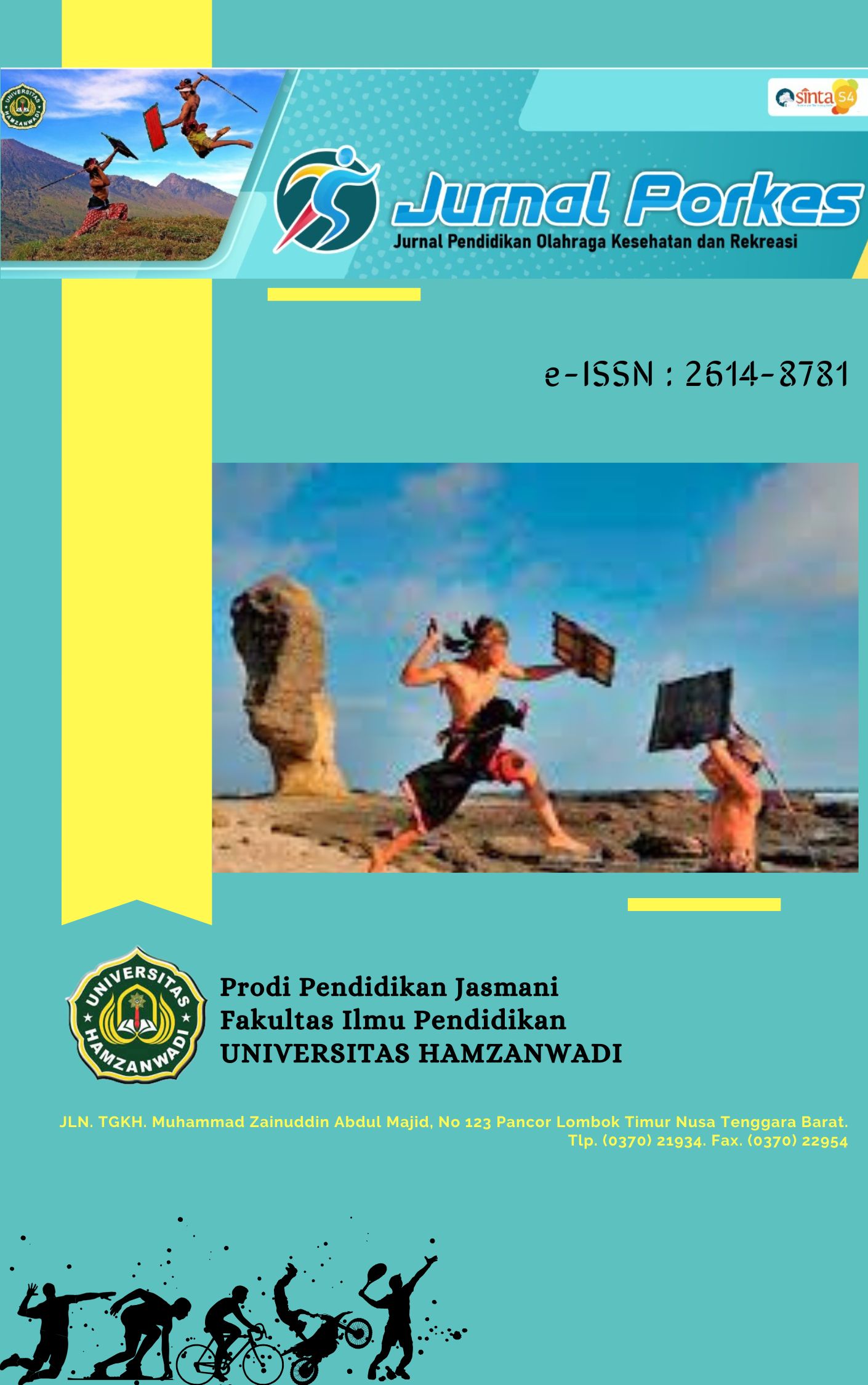Game Challenge Cards: A Systematic Review on Gamification for Elementary Volleyball Skills
DOI:
https://doi.org/10.29408/porkes.v8i2.30387Keywords:
Gamification; volleyball skills; challenge cards; skill acquisition; motivationAbstract
The incorporation of gamification elements in physical education signifies a pedagogical advancement capable of improving student engagement and skill acquisition. This systematic literature review evaluates the efficacy of Game Challenge Cards as a gamification tool for enhancing volleyball abilities in elementary school children. In accordance with PRISMA criteria, we conducted a systematic analysis of 35 peer-reviewed articles published from 2018 to 2025, sourced from the Scopus, Web of Science, ERIC, and SportDiscus databases. The results indicate that gamification methods employing challenge cards substantially improve the acquisition of essential volleyball abilities (impact sizes between d=0.52-0.87), elevate student motivation (assessed by validated measures), and foster inclusive learning settings. Game Challenge Cards exhibit efficacy via organized visual guidance, incremental skill enhancement, prompt feedback systems, and recognition of accomplishments. The efficacy of implementation is influenced by aspects such as design quality, integration into broader pedagogical frameworks, and teacher preparation. This review adds to the expanding evidence supporting gamification in physical education and offers physical educators research-based techniques to improve volleyball instruction in elementary environments. Future research directions encompass the examination of long-term skill retention, the exploration of digital-physical integration possibilities, and the investigation of tailored applications for distinct student populations.
References
Barba-Martín, R. A., Bores-García, D., Hortigüela-Alcalá, D., & González-Calvo, G. (2021). The application of the teaching games for understanding in physical education. Systematic review of the last six years. International Journal of Environmental Research and Public Health, 18(1), 31. https://doi.org/10.3390/ijerph17093330
Capp, M. J. (2017). The effectiveness of universal design for learning: a meta-analysis of literature between 2013 and 2016. International Journal of Inclusive Education, 21(8), 791–807. https://doi.org/10.1080/13603116.2017.1325074
Deterding, S., Dixon, D., Khaled, R., & Nacke, L. (2011). From game design elements to gamefulness: Defining “gamification.” Proceedings of the 15th International Academic MindTrek Conference, 9–15. https://doi.org/10.1145/2181037.2181040
Dudley, D., Okely, A., Pearson, P., & Cotton, W. (2011). Effective physical education and school sport: a systematic review of physical education and school sport interventions targeting physical activity, movement skills and enjoyment of physical activity. Journal of Science and Medicine in Sport, 14, e50. https://doi.org/10.1016/j.jsams.2011.11.103
Farias, C., Valério, C., & Mesquita, I. (2019). Sport education as a curriculum approach to student learning of invasion games: Effects on game performance and game involvement. Journal of Sports Science & Medicine, 18(1), 91–102. https://pmc.ncbi.nlm.nih.gov/articles/PMC5844209/
Fernandez-Rio, J., de las Heras, E., González, T., Trillo, V., & Palomares, J. (2020). Gamification and physical education. Viability and preliminary views from students and teachers. Physical Education and Sport Pedagogy, 25(5), 509–524. https://doi.org/10.1080/17408989.2020.1743253
Gao, J., Song, W., Zhong, Y., Huang, D., Wang, J., Zhang, A., & Ke, X. (2024). Children with developmental coordination disorders: a review of approaches to assessment and intervention. Frontiers in Neurology, 15, 1359955. https://doi.org/10.3389/FNEUR.2024.1359955
Gisbert-Pérez, J., Martí-Vilar, M., Merino-Soto, C., Chans, G. M., & Badenes-Ribera, L. (2024). Gender differences in internet gaming among university students: a discriminant analysis. Frontiers in Psychology, 15, 1412739. https://doi.org/10.3389/fpsyg.2024.1412739
Iffah, N., Basyiruddin, B., Aman, M. S., Hidayatullah, G. G., & Sillah, E. (2024). Development of Flash Card Instructional Media in the Context of Game-Based Volleyball Learning to Improve Collaboration Skills and Student Achievement. JOSSAE (Journal of Sport Science and Education), 9(1), 56–62. https://doi.org/10.26740/JOSSAE.V9N1.P56-62
Kostenius, C., Hallberg, J., & Lindqvist, A. K. (2018). Gamification of health education: Schoolchildren’s participation in the development of a serious game to promote health and learning. Health Education, 118(4), 354–368. https://doi.org/10.1108/HE-10-2017-0055
Krivyca, I., Nesen, O., Strelnykova, Y., Wnorowski, K., Lyceum, K., City Council, K., Region, K., & Skovoroda Kharkiv, H. S. (2023). Development of volleyball skills in physical education lessons using visual imagery in 10-11-year-old schoolchildren. Physical Culture, Recreation and Rehabilitation, 2(1), 24–29. https://doi.org/10.15561/PHYSCULT.2023.0104
Leiss, L., Großschedl, J., Wilde, M., Fränkel, S., Becker-Genschow, S., & Großmann, N. (2025). Gamification in education—teachers’ perspectives through the lens of the theory of planned behavior. Frontiers in Psychology, 16, 1571463. https://doi.org/10.3389/fpsyg.2025.1571463
López-Ferrer, A., Marco-Ahulló, A., Monfort-Torres, G., Ramón-Llin, J., de Moraes Filho, J. A., & García-Massó, X. (2022). Effectiveness of the Type of Feedback on Learning to Pass in Volleyball. Journal of Motor Learning and Development, 10(1), 184–199. https://doi.org/10.1123/JMLD.2021-0033
Luo, L. (2022). A Study on the Application of Computer-Aided Dual-Coding Theory in English Vocabulary Teaching. Scientific Programming, 2022(1), 5951844. https://doi.org/10.1155/2022/5951844
Oppici, L., Panchuk, D., Serpiello, F. R., & Farrow, D. (2018). The influence of a modified ball on transfer of passing skill in soccer. Psychology of Sport and Exercise, 39, 63-71. https://doi.org/10.1016/j.psychsport.2018.07.015
Østerlie, O., & Mehus, I. (2020). The impact of flipped learning on cognitive knowledge learning and intrinsic motivation in Norwegian secondary physical education. Education Sciences, 10(4), 110. https://doi.org/10.3390/educsci10040110
Richards, K. A. R., Gaudreault, K. L., & Woods, A. M. (2017). Understanding physical educators' perceptions of mattering: Validation of the Perceived Mattering Questionnaire-Physical Education. European Physical Education Review, 23(1).
https://doi.org/10.1177/1356336X16637320
Romero-Rodríguez, J. M., Martínez-Menéndez, A., Alonso-García, S., & Victoria-Maldonado, J. J. (2024). The reality of the gamification methodology in Primary Education: A systematic review. International Journal of Educational Research, 128, 102481. https://doi.org/10.1016/J.IJER.2024.102481
Rudd, J. R., Pesce, C., Strafford, B. W., & Davids, K. (2020). Physical literacy - A journey of individual enrichment: An ecological dynamics rationale for enhancing performance and physical activity in all. Frontiers in Psychology, 11, 1904. https://doi.org/10.3389/fpsyg.2020.01904
Ryan, R. M., & Deci, E. L. (2020). Intrinsic and extrinsic motivation from a self-determination theory perspective: Definitions, theory, practices, and future directions. Contemporary Educational Psychology, 61, 101860. https://doi.org/10.1016/j.cedpsych.2020.101860
Downloads
Published
How to Cite
Issue
Section
License
Copyright (c) 2025 Nasrullah, Januar Abdilah Santoso, Jeane Betty Kurnia Jusuf

This work is licensed under a Creative Commons Attribution-ShareAlike 4.0 International License.
![]()
Jurnal Porkes is licensed under a Creative Commons Attribution-Share Alike 4.0 International License







